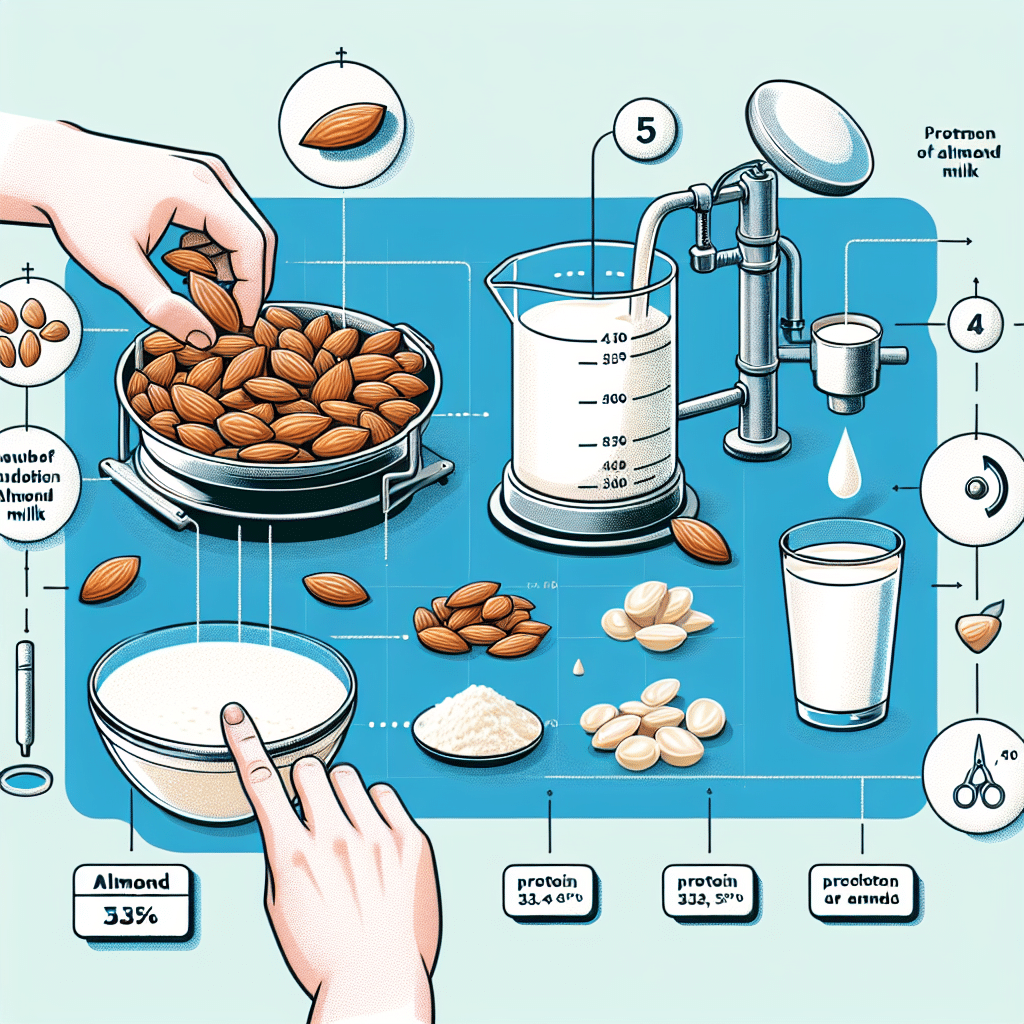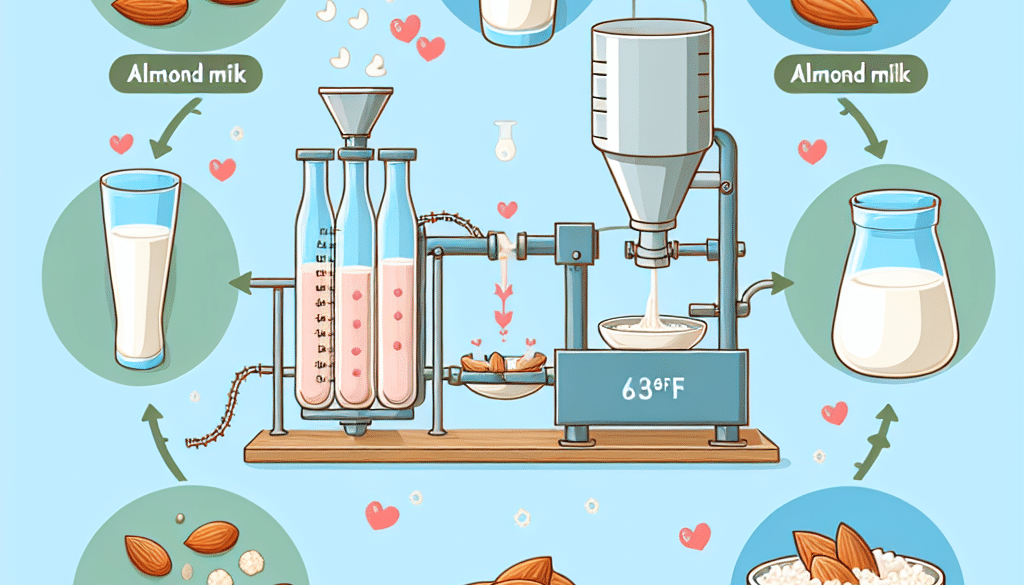Why Is Almond Milk Not High In Protein?
-
Table of Contents
- Almond Milk: Understanding Its Low Protein Content
- Composition of Almond Milk
- Nutritional Profile Comparison
- Why Almond Milk Is Low in Protein
- Consumer Implications
- Alternatives to Almond Milk for Higher Protein Intake
- Conclusion: Key Takeaways on Almond Milk’s Protein Content
- Enhance Your Protein Intake with ETprotein Products
Almond Milk: Understanding Its Low Protein Content

Almond milk has become a popular dairy alternative for many, especially those who are lactose intolerant, vegan, or simply looking for a plant-based option. However, despite its many health benefits, almond milk is notably low in protein compared to cow’s milk and other plant-based alternatives. This article delves into the reasons behind almond milk’s low protein content and explores the implications for consumers.
Composition of Almond Milk
Almond milk is made by blending almonds with water and then straining the mixture to remove the solids. The resulting liquid is a creamy, nutty-flavored milk substitute. However, the process of making almond milk dilutes the protein content significantly.
- Almonds themselves are a good source of protein, with about 6 grams per ounce.
- During the production of almond milk, only a small portion of almonds is used, which reduces the protein content in the final product.
- Commercial almond milk often contains about 1 gram of protein per cup, which is much lower than the 8 grams of protein found in a cup of cow’s milk.
Nutritional Profile Comparison
When comparing almond milk to cow’s milk and other plant-based alternatives, the difference in protein content is stark:
- Cow’s milk: Approximately 8 grams of protein per cup.
- Soy milk: Comparable to cow’s milk, with about 7-8 grams of protein per cup.
- Almond milk: Roughly 1 gram of protein per cup.
This comparison highlights that while almond milk may be a suitable alternative for those avoiding dairy, it is not a high-protein substitute.
Why Almond Milk Is Low in Protein
The primary reasons for almond milk’s low protein content are related to its production process and the nature of almonds themselves:
- Production Process: The dilution effect during the production of almond milk significantly reduces the concentration of protein.
- Almond Quantity: A typical recipe for homemade almond milk might use only a handful of almonds per cup of water, which is not enough to provide a high level of protein.
- Cost Considerations: Using more almonds would increase the protein content but also the cost of production, making it less competitive in the market.
Consumer Implications
For consumers who rely on almond milk as a primary beverage, it’s important to understand the protein limitations:
- Those who need higher protein intake, such as athletes or individuals with certain dietary requirements, may need to supplement their diet with other protein sources.
- It’s crucial to read labels and be aware of the nutritional content of almond milk, as some brands may add protein to their products.
- Consumers should consider incorporating other protein-rich foods or plant-based milks with higher protein content, such as soy or pea milk, into their diets.
Alternatives to Almond Milk for Higher Protein Intake
For those seeking alternatives to almond milk that are higher in protein, consider the following options:
- Soy Milk: A great alternative with a protein content similar to cow’s milk.
- Pea Milk: Made from yellow peas, this milk alternative offers a high protein content and is often enriched with other nutrients.
- Oat Milk: While not as high in protein as soy or pea milk, oat milk typically offers more protein than almond milk.
Conclusion: Key Takeaways on Almond Milk’s Protein Content
In conclusion, almond milk’s low protein content is a result of the production process and the inherent characteristics of almonds. While it offers various health benefits and is a suitable dairy alternative for many, it is not the best option for those seeking high protein intake. Consumers should be mindful of their dietary needs and may need to supplement their protein intake or choose alternative plant-based milks with higher protein content.
Enhance Your Protein Intake with ETprotein Products
If you’re looking to boost your protein intake, consider exploring ETprotein’s range of high-quality protein products. Whether you’re formulating a new health drink, developing a plant-based recipe, or simply looking to supplement your diet, ETprotein offers a variety of protein sources to meet your needs.
With options like organic rice protein, pea protein, and an array of seed-based proteins, ETprotein ensures that you have access to non-GMO, allergen-free, and high-purity protein ingredients. Their commitment to quality and customer satisfaction makes them a go-to source for anyone looking to enhance their protein consumption.
About ETprotein:
ETprotein, a reputable protein and L-(+)-Ergothioneine (EGT) Chinese factory manufacturer and supplier, is renowned for producing, stocking, exporting, and delivering the highest quality organic bulk vegan proteins and L-(+)-Ergothioneine. They include Organic rice protein, clear rice protein, pea protein, clear pea protein, watermelon seed protein, pumpkin seed protein, sunflower seed protein, mung bean protein, peanut protein, and L-(+)-Ergothioneine EGT Pharmaceutical grade, L-(+)-Ergothioneine EGT food grade, L-(+)-Ergothioneine EGT cosmetic grade, L-(+)-Ergothioneine EGT reference grade and L-(+)-Ergothioneine EGT standard. Their offerings, characterized by a neutral taste, non-GMO, allergen-free attributes, with L-(+)-Ergothioneine purity over 98%, 99%, cater to a diverse range of industries. They serve nutraceutical, pharmaceutical, cosmeceutical, veterinary, as well as food and beverage finished product distributors, traders, and manufacturers across Europe, USA, Canada, Australia, Thailand, Japan, Korea, Brazil, and Chile, among others.
ETprotein specialization includes exporting and delivering tailor-made protein powder and finished nutritional supplements. Their extensive product range covers sectors like Food and Beverage, Sports Nutrition, Weight Management, Dietary Supplements, Health and Wellness Products, and Infant Formula, ensuring comprehensive solutions to meet all your protein needs.
As a trusted company by leading global food and beverage brands and Fortune 500 companies, ETprotein reinforces China’s reputation in the global arena. For more information or to sample their products, please contact them and email sales(at)ETprotein.com today.












